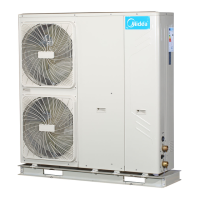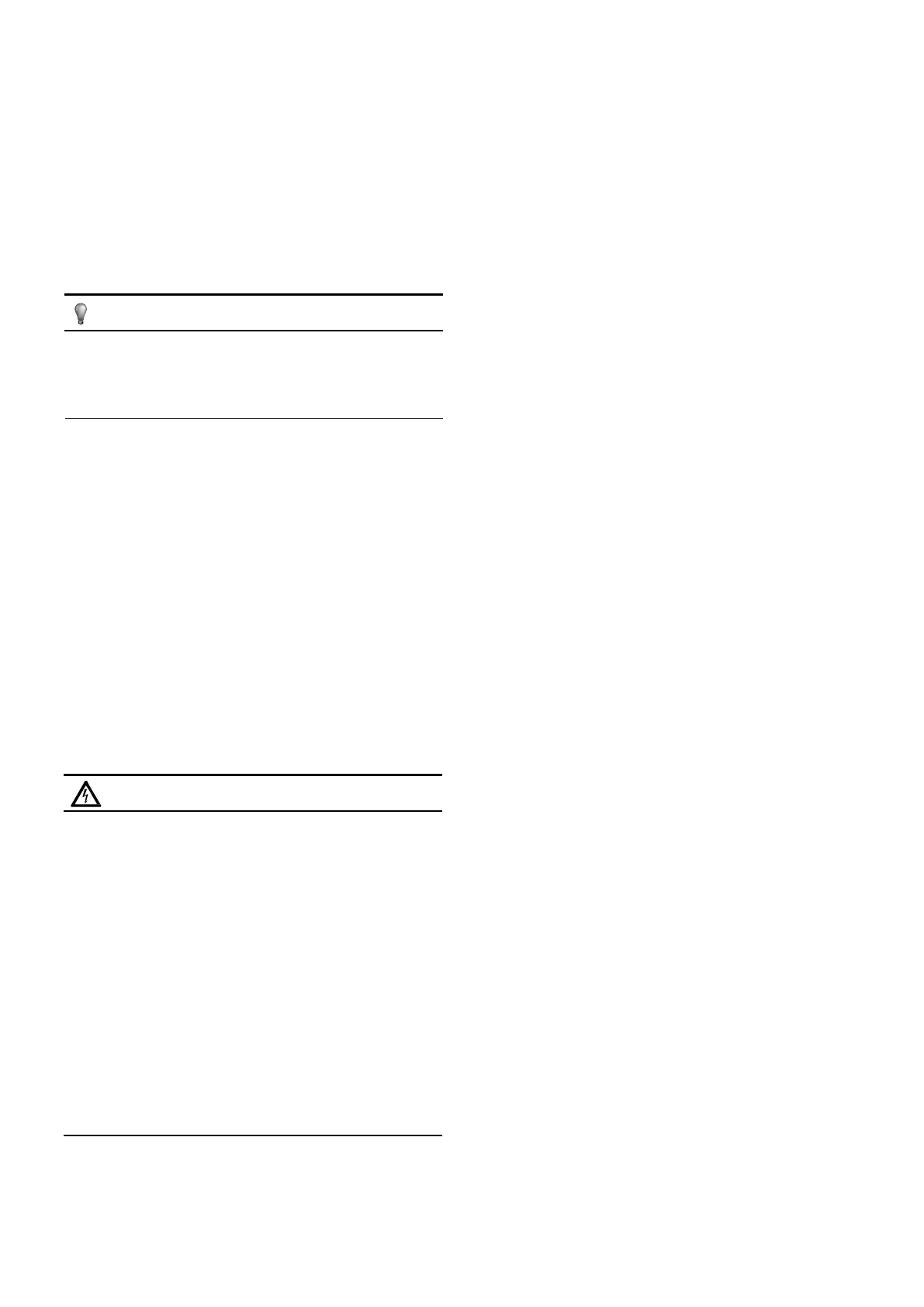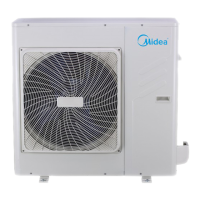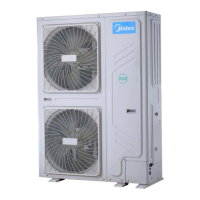11 TEST RUN AND FINAL CHECK
The installer is obliged to verify correct operation of unit after
installation.
12 MAINTENANCE AND SERVICE
In order to ensure optimal availability of the unit, a number of checks
and inspections on the unit and the field wiring have to be carried
out at regular intervals.
This maintenance needs to be carried out by your local technician.
In order to ensure optimal availability of the unit, a number of checks
and inspections on the unit and the field wiring have to be carried out
at regular intervals.
This maintenance has to be carried out by your local Midea technician.
11.1 Final check
Before switching on the unit, read following recommendations:
■ When the complete installation and all necessary settings have
been carried out, close all front panels of the unit and refit the unit
cover.
■ The service panel of the switch box may only be opened by a
licensed electrician for maintenance purposes.
11.2 Test run operation (manual)
If required, the installer can perform a manual test run operation at
any time to check correct operation of air purge, heating, cooling
and domestic water heating, refer to 10.7 Field settings/test run.
ELECTRIC SHOCK
■ Before carrying out any maintenance or repair activity,
always switch off the circuit breaker on the supply panel,
remove the fuses (or switch off the circuit breakers) or
open protection devices of the unit.
■ Make sure that before starting any maintenance or repair
activity that the power supply to the outdoor unit is switched off.
■ Do not touch live parts for 10 minutes after the power
supply is turned off because of high voltage risk.
■ The heater for the compressor may operate even in stop mode.
■ Please note that some sections of the electric component
box are hot.
■ Make sure you do not touch a conductive section.
■ Do not rinse the unit. This may cause electric shocks or
fire.
■ When service panels are removed, live parts can be easily
touched by accident.
Never leave the unit unattended during installation or
servicing when service panel is removed.
The described checks must be executed at least once a year by
qualified personnel.
1. Water pressure
Check if the water pressure is above 1 bar. If necessary add
water.
2. Water filter
Clean the water filter.
3. Water pressure relief valve
Check for correct operation of the pressure relief valve by turning
the black knob on the valve counter-clockWise:
■ If you do not hear a clacking sound, contact your local dealer.
■ In case the water keeps running out of the unit, close both the
water inlet and outlet shut-off valves first and then contact your
local dealer.
4. Pressure relief valve hose
Check that the pressure relief valve hose is positioned
appropriately to drain the water.
5. Backup heater vessel insulation cover
Check that the backup heater insulation cover is fastened tightly
around the backup heater vessel.
6. Domestic hot water tank pressure relief valve (field supply)
Applies only to installations with a domestic hot water tank.
Check for correct operation of the pressure relief valve on the
domestic hot water tank.
7. Domestic hot water tank booster heater
Applies only to installations with a domestic hot water tank.
It is advisable to remove lime buildup on the booster heater to
extend its life span, especially in regions with hard water. To do
so, drain the domestic hot water tank, remove the booster heater
from the domestic hot water tank and immerse in a bucket (or
similar) with lime-removing product for 24 hours.
8. Unit switch box
■ Carry out a thorough visual inspection of the switch box and
look for obvious defects such as loose connections or defective
wiring.
■ Check for correct operation of contactors with an ohm meter.
All contacts of these contactors must be in open position.
9. Use of glycol
(Refer to 9.3 Water pipework Caution: "Use of glycol" )
Document the glycol concentration and the pH-value in the
system at least once a year.
■ A PH-value below 8.0 indicates that a significant portion of the
inhibitor has been depleted and that more inhibitor needs to be
added.
■ When the PH-value is below 7.0 then oxidation of the glycol
occurred, the system should be drained and flushed thoroughly
before severe damage occurs.
Make sure that the disposal of the glycol solution is done in
accordance with relevant local laws and regulations.
DANGER
NOTE
That during the first running period of the unit, required power
input may be higher than stated on the nameplate of the unit. This
phenomenon originates from the compressor that needs elapse of
a 50 hours run in period before reaching smooth operation and
stable power consumption.
13 TROUBLE SHOOTING
This section provides useful information for diagnosing and
correcting certain troubles which may occur in the unit.
This troubleshooting and related corrective actions may only be
carried out by your local technician.
13.1 General guidelines
Before starting the troubleshooting procedure, carry out a thorough
visual inspection of the unit and look for obvious defects such as
loose connections or defective wiring.
49

